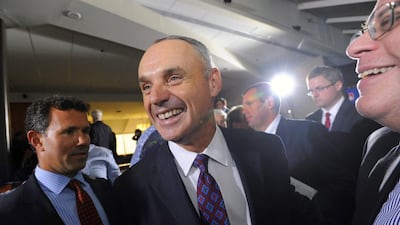Rob Manfred shares some of the same qualities as outgoing Major League Baseball commissioner Bud Selig, but as the next commissioner he is expected to bring more of a modern management style to the job.
Manfred rose to MLB prominence by forging a strong working relationship with the Players Association as the owners’ head of labour relations for 15 years, achieving an era of labour peace after decades of stormy conflict.
He used the goodwill gained from three successful collective bargaining agreements with the players’ union on another critical collaboration with the players – the joint drug agreement that has helped baseball battle use of performance enhancing drugs.
Selig has often been drawn as a masterful consensus builder; a quintessential backroom dealer able to win support for his initiatives.
“He is the Rocky Marciano of baseball politics. He is undefeated,” former MLB commissioner Fay Vincent said on ESPN Radio about the prowess of Selig before the owners’ meeting.
On Thursday, Selig kept his record intact as protege Manfred triumphed despite falling shy of the 23 votes required from the 30 clubs on the first six ballots because of a stubborn challenge by owners backing Boston Red Sox chairman Tom Werner.
In the end, Manfred benefited from the glow of Selig’s success, which in the past 11 years took MLB’s revenues from US$3.9 billion ($14.3bn) to $8 billion.
St Louis Cardinals chairman Bill DeWitt Jr, head of the owner’s candidate search committee, said: “I think some of Rob’s greatest attributes are his ability to reach consensus.”
San Francisco Giants president Larry Baer said it was not clear what finally ended Werner’s challenge, but said Manfred fit the bill for pushing baseball forward.
“You never know quite how the sausage gets made,” Baer said when asked how the voting stalemate was broken, “but that probably has a shelf life of about 20 minutes and when Rob takes over in January nobody is going to be thinking about that.
“Over the years he has engendered a lot of trust and confidence with all 30 clubs.”
While there are positive economic signs for baseball in increased attendance, improved franchise values and competitive balance, there are also nagging concerns.
Attracting younger fans to the game is a vital issue as is speeding up the pace of play, growing the game internationally, improving the marketing and taking better advantage of high-tech opportunities.
“It’s a much more sophisticated operation,” Baer said about the business of baseball since Selig took charge 22 years ago.
“The job is much more complicated.
“You’re not dealing with a 20-, 25-channel world, but a 500-channel universe, and the internet, and communicating with people walking down the street consuming baseball.”
Follow us on twitter at @SprtNationalUAE

